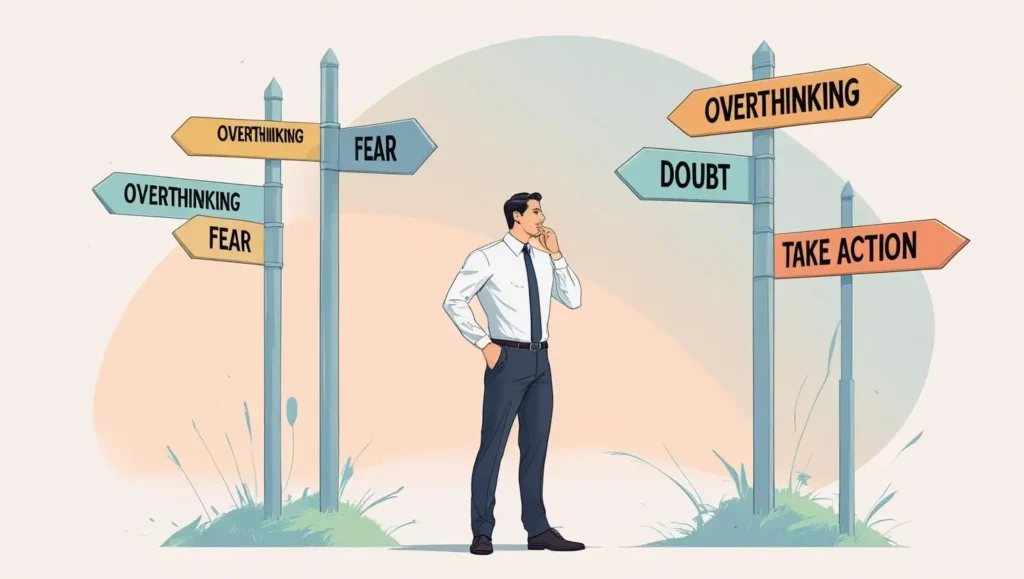
We have all been there—lying awake at night, replaying conversations, overanalyzing decisions, and imagining worst-case scenarios that may never happen. Overthinking is something almost everyone experiences at some point in life. While reflection and thoughtful analysis are healthy, there is a fine line between careful consideration and mental paralysis.
Overthinking not only wastes time but also drains your energy, increases anxiety, and hinders your ability to make clear decisions.
If you have ever caught yourself saying things like:
- “What if this does not work?”
- “Maybe I need more information…”
- “What will people think?”
- “I will decide tomorrow… again.”
Then, you are likely caught in the overthinking loop.
The Hidden Costs of Overthinking
- Lost time and productivity
- Mental and emotional exhaustion
- Missed opportunities and delayed progress
- Damaged self-confidence and decision-making ability
The reassuring fact is that overthinking is something you can learn to manage and move beyond. And it can be changed like any other habit.
In This Post, We Will Explore:
- Why we overthink – The psychological triggers behind this mental habit
- How overthinking silently sabotages your productivity and happiness
- Practical, actionable steps to break free – Proven strategies you can apply today to start making confident decisions and move forward with clarity
Let us dive in.
Understanding Overthinking: What Is Happening in Your Mind
Overthinking is not just a random habit. It is deeply connected with how the human brain processes information and evaluates risk. Psychologists often refer to this state as “Analysis Paralysis”. This is a mental freeze that occurs when we are faced with too many choices or too much information. Our brains get overwhelmed, and it becomes difficult for us to arrive at a clear decision.
Another contributing factor to overthinking is Decision Fatigue. It is a psychological condition where the quality of decisions deteriorates after making too many choices throughout the day. By the time we reach a point where a decision is needed, our mental resources are depleted, and we fall into a cycle of overthinking.
There are several reasons why overthinking occurs:
- Fear of Failure: It is worrying about making the wrong decision and facing the consequences. Read more on finding your purpose to break through decision fog.
- Fear of Judgment: Concern over how others will perceive our actions
- Perfectionism: The internal pressure to find the perfect solution before taking action
Consider this: Have you ever stood in a supermarket aisle, unable to choose between two similar products for far longer than necessary? That is a simple, everyday example of how easily overthinking can creep into even the smallest decision. Becoming aware of these psychological triggers is the first step toward change.
Some years ago, I got an opportunity for a leadership role overseas. The opportunity was full of excitement and offered a promising future. But my mind was flooded with a vast amount of doubts. I kept worrying about the unknowns—cultural adjustment, work-life balance, and the risk of failure.
After considerable deliberation, I could prepare myself mentally to take the challenge and accepted the role. That stint became one of the most rewarding chapters of my career. That experience taught me that while fear and doubts are natural, allowing them to dictate our decisions often leads to missed opportunities for growth. This was a turning point in my professional journey. Learn more about my story and leadership journey here.
Signs You Are Stuck in Overthinking Mode
The first step to managing overthinking is learning to spot it. The real problem is that it often feels like productive thinking until it begins to stall your progress. Usually, people fail to recognize when they slip into this unproductive mental pattern.
These are a few common signs that you may be caught in the overthinking cycle:
- Constant Second-Guessing: You routinely question your decisions, no matter how minor, and often revisit choices long after they have been made. This continuous internal back-and-forth can erode confidence over time.
- Procrastination: You struggle to move tasks forward because much of your energy is spent analyzing options rather than executing them. As a result, even straightforward tasks can remain unfinished.
- Excessive Research: You spend hours gathering information, reading reviews, or asking for opinions, but still feel unsure about what to do next.
- Imagining Worst-Case Scenarios: Your mind drifts towards adverse outcomes, making simple decisions feel risky and overwhelming.
- Mental Exhaustion: Even minor decisions leave you feeling drained, as if you have been through a significant emotional event.
- Difficulty Sleeping: Your thoughts continue racing long after you go to bed, preventing restful sleep.
Suppose you notice one or more of these patterns in your daily life. In that case, it is a strong indication that overthinking is affecting your ability to act decisively and move forward with confidence.
The Cost of Overthinking
The harm of overthinking may not be discernible in the beginning. However, over time, it can create serious consequences in both your personal and professional life. The impact of overthinking is not limited to your emotional elements; rather, it affects your productivity, decision-making ability, and overall well-being.
Here are some of the most common and damaging effects of overthinking:
- Reduced Productivity: The Time that you could have used to take action is lost in endless loops of analysis and doubt.
- Increased Anxiety and Stress: Constant mental noise elevates cortisol levels, leading to chronic stress, worry, and emotional fatigue.
- Missed Opportunities: By delaying decisions, you may lose out on time-bound chances—whether it is a career opportunity, a personal relationship, or a new experience.
- Damaged Confidence: Frequent second-guessing erodes self-trust. Over time, you begin to doubt your ability to make sound decisions.
- Strained Relationships: People around you may perceive you as indecisive or uncommitted, affecting both personal and professional interactions.
Many successful leaders, entrepreneurs, and decision-makers understand that speed and decisiveness often outweigh the pursuit of perfection. They follow the principle of “progress over perfection,” knowing that clarity comes through action.
A few years ago, I missed a chance to speak at a leadership summit. I had a formal invitation to speak to the audience in a session about people’s performance and coaching strategies. However, I fell into decision paralysis by second-guessing myself. I wondered if I was qualified, given my experience, to address such an informed audience, or if my message would resonate with them.
By the time I finally made up my mind, the opportunity was already gone. That experience stuck with me—it was a quiet but powerful reminder of how easily self-doubt and hesitation can hold us back, often without us noticing until it is too late. Coming face-to-face with the cost of overthinking can be a turning point. It creates the kind of emotional clarity that pushes you to take back control of your choices, your time, and your momentum.
Even while writing my first book, Bihari Boy in Kerala, I found myself overthinking the title and storyline and even questioning whether anyone would want to read it. Self-doubt crept in repeatedly. It was only after I set a non-negotiable publishing deadline that I finally moved forward and completed the manuscript. That decision changed everything.
Learn how having a clear vision helps in decision-making and overcoming mental roadblocks in my post: Why Vision? The Essential Recipe for Organizational & Individual Impact.
How to Overcome Overthinking: Practical Strategies
To overcome overthinking begins with breaking from overthinking. Breaking free from overthinking is not about shutting your thoughts down; it is about learning to think more clearly and intentionally. Instead of getting stuck in endless mental loops, your goal should be shifting toward focused, purposeful action that actually moves you forward.
The given below practical and proven strategies can help you regain control over your decision-making process:
Set Time Limits for Decisions
Establish a specific time frame for making each decision, especially for routine matters. For example, give yourself 30 minutes to choose between two job offers or 10 minutes to decide on a weekend plan. Time constraints force the mind to focus and act.
To learn how to structure your day effectively can protect your mind from fatigue. Explore my post on time management for long-term clarity.
Focus on Progress More Than Perfection
Aim for making good decisions, not flawless ones. They say that waiting for the perfect solution often leads to inaction. Remember the popular saying: “Done is better than perfect.” This is where cultivating a growth mindset becomes transformative.
Apply 5-5-5 Rule
Ask yourself three simple questions before overthinking consumes you:
- Will this matter five days from now?
- Will this matter five months from now?
- Will this matter five years from now?
This mental exercise puts current worries into long-term perspective.
Limit Information Consumption
Gathering too much information often fuels overthinking. Set a limit on the number of sources or the amount of time you will spend on research before making a decision.
Focus on Actionable Next Steps
When you feel stuck, shift your focus from the big picture to the next smallest actionable step. Ask yourself: “What is one small thing I can do right now to move forward?”
Practice Writing Things Down
A habit of writing down your thoughts on paper can help you declutter your thinking process. Maintain a simple decision journal or a daily planner to organize your thoughts and reduce mental clutter.
Set Non-Negotiable Deadlines
Deadlines create healthy pressure that prevents decisions from dragging endlessly. Once a deadline is set, commit to making a decision by that time, regardless of the circumstances.
By consistently applying these strategies, you will begin to break the habit of overthinking and replace it with purposeful, decisive action.
Seek Help When Overthinking Becomes Chronic
While occasional overthinking is a regular part of life, there are times when it becomes chronic and starts affecting your mental health and daily functioning. Once you find that overthinking is leading to persistent anxiety, sleepless nights, or difficulty in making even the simplest decisions, it may be a sign that professional support is needed.
When things weigh heavy on your mind, seeking help from someone trained in mental health can be a wise and courageous choice. These professionals can help you identify underlying causes, they can teach you mechanisms to cope, and provide tools to regain control over your thoughts.
Resorting to such help is not a sign of weakness; it is a wise move. It is a proactive step to building emotional well-being and mental clarity. As we consult health professionals for physical ailments, addressing chronic patterns of overthinking deserves equal attention and care.
Your mental health is a core pillar of both personal success and lasting happiness. Prioritizing it is not just self-care—it is a strong expression of self-leadership.
Final Reflections: Clarity Comes Through Action
Overthinking does not indicate a lack of intelligence—it typically appears when we hesitate to act. The more we sit with uncertainty, replaying scenarios in our heads, the more our thoughts start to spiral. What clears that mental fog is not more thinking—it is doing.
Absolute clarity rarely arrives before the first step. It reveals itself in motion, not in stillness. Progress is not about waiting for the perfect moment—it is about creating momentum through intentional, imperfect action.
On the path to growth and success, choosing to move—even when things are unclear—is what sets you apart. So trust your instincts, take the next step, and let confidence grow through action.
Because the truth is simple: every breakthrough begins with a choice—to move forward.
To discover how to build influence and lead without formal authority, explore this article: How to Lead Without a Title: Build Influence, Earn Trust, Make Impact.
What About You?
What is one small action you will take today to break free from overthinking? Share your thoughts in the comments below.
If you would like to share your experience or ask a question privately, feel free to reach out through the Contact page.
Disclaimer: This article is based on personal experience and insights. It does not constitute financial, legal, or medical advice.





